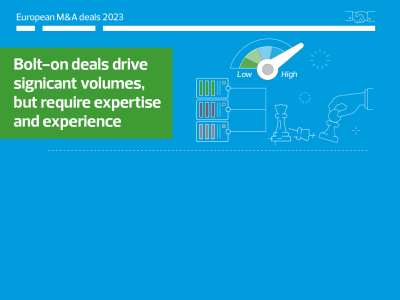Positives to be found in challenging M&A market landscape
Plenty of M&A opportunity for those willing to go extra mile
Global mergers and acquisitions (M&A) activity remains largely positive in the small to mid-cap segment even while mega deals appear to be slowing in the face of widespread economic slowdown, rising inflation and the uncertainty created by a range of geopolitical events.
Early indications for 2023 suggest there is and will continue to be a sharpened focus on micro-segments and portfolio building, with a significant volume of dry powder across private equity seeking safe havens insulated from eroding margins and reduced trade volumes.
However this increasingly complex and disparate M&A landscape also means deals can take longer to complete, require more contingency and negotiation, and depend on multiple teams with deep experience across different geographies and sectors.
Microeconomics
Investors seeking value in the current market environment may need to dig a bit deeper, look a bit longer and weigh more variables. Nevertheless, according to Eric Fougedoire, Partner at RSM France, there remains plenty of deals to do.
"The impacts going forward are going to be very differentiated from one industry – or one sector or position – to the next," he said. "Micro-positioning will really make a difference, because you can sidestep those areas where margins are being eroded or volumes are shrinking."
Fougedoire added: "You should not be surprised to see a lot of activity where money, following on from robust analysis, is specifically oriented towards profitable segments less exposed to consumer pressures."
Volkmar Berner, Partner with RSM Germany and member of the RSM Global Financial Due Diligence Leadership Team, said the end result is often more protracted transactions: "Processes are without doubt taking longer."
He added: "There are ongoing discussions about, for instance, how reliable a business model might be, or the level to which risks can be mitigated, perhaps the impact of a soft market in forward-looking plans. That can drive a valuation process that is both more difficult and more dynamic."
Maintaining momentum
Activity nevertheless remains strong. Berner said deals in the current climate are increasingly cross-border and targeted more sharply than ever on specific segments – B2B software, software as a service, digitalisation, clean energy – which offer resistance to inflation across power, raw materials and tighter supply chains.
Bolt-on deals also remain attractive. "These represent a key value-add for a range of investors," said Berner. "Building on existing platform companies, these types of deals ideally complement core competencies and industrial solutions, provide expansion opportunities either in geography or customers, and drive economy across the value chain."
According to Lee Castledine, Partner at RSM UK and member of the RSM Global Financial Due Diligence Leadership Team, there is also significant movement in M&A activity seeking global exposure.
"We have seen an increase in money crossing borders, from the US into the UK and Europe, from the UK into Europe, and also increasingly from the UK into the US. Private equity is often looking for a foothold in new markets, a base from which to launch future activity, and that is despite whatever volatility you might see in exchange rates."
Expert guidance
Castledine suggests high quality due diligence is even more crucial in such an environment.
"There is real expertise required– including tax, regulation, cross-border impacts – and that will become more important because multi-nation deals are only going to increase in number. The world continues to get smaller and more connected, and it is only natural that the M&A sector, by necessity, reflects that."







